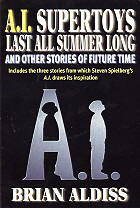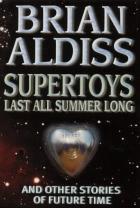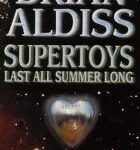What’s Past is Prologue
Dilemmas in Brian W. Aldiss’ “Super-Toys Last All Summer Long”
by Donna Ross Hooley
“What’s past is prologue”(II, i, 261) is a quote from The Tempest, a play Aldiss references several times in his introduction (1989) to the 1988 collection Man in His Time: Best SF Stories of Brian Aldiss, which includes the short story “Super-Toys Last All Summer Long” (1969). This year a new short story collection, featuring “Super-Toys” as the title short story, and Steven Spielberg’s film AI, based on “Super-Toys,” make their appearance. Spielberg wrote and directed the film, which Stanley Kubrick worked on from well before when Kubrick finally bought the story from Aldiss in 1982 until Kubrick’s death in 1999. Spielberg said in a press release that “Stanley had a vision for this project that was evolving over 18 years. I am intent on bringing to the screen as much of that vision as possible along with elements of my own.” Certainly many writers have had a go at developing the story into a vision suitable for a full-length film, including Bob Shaw, Sara Maitland, and Arthur C. Clarke. Aldiss made the effort himself, but had problems with Kubrick’s vision: “By 1990 we were in difficulties. . . . I tried to tell Stanley that he should create a great modern myth to rival Strangelove and 2001, and to avoid fairy tale.” Aldiss also said that “Neither he [Kubrick], nor anyone who worked on it, could think how it might be developed. The reason is simple: my story is a vignette, complete in itself.” Obviously, the history behind the making of the film AI, while as fascinating and apparently as chaotic as a shipwreck, is also only prologue; at present the story is the new collection and the film. In “Super-Toys” itself, however, the people, as Aldiss commented at last year’s ICFA 21, are the story. That fact is not obvious on a first read, given the foreboding sense of a Frankenstein moment to come, of the teddy bear/teacher android going amok. First the focus is on Teddy, followed by the moment of truth when the ending reveals that David, who has been depicted as a mysterious and troubled child, is an android too. How easy at that moment to be smugly satisfied, to accept the plot twist and then turn the page. Just as surely as Teddy has drawn the eye away from David, Teddy and David together draw the eye away from David’s surrogate parents and what this situation is doing to them and may do to their society.
Henry and Monica Swinton, the parents, live a life of luxury since Henry’s company, Synthank, has been highly successful. While they wait, hoping to win the lottery that will allow them to have a child in an already crushing population crisis, they have brought into their home what seems to be a prototype android child, apparently to fill the void in their lives while testing the merchandise, Henry’s company being the proud manufacturer of their bundle of joy. The android child David has a companion android that looks like a small Teddy bear, whose job it is to counsel, teach and comfort David. The Swintons win the lottery as the story ends; David is therefore superfluous, perhaps malfunctioning, and certainly returnable.
Neither David’s parents nor the society is more than sketched in; as Aldiss says, short stories are “fleeting perceptions,” “mayfly,” lower-table handmaidens of the truth that often present “things [that]may seem plausible which are not really credible” (MIHT viii). The lack of credibility, or in other words the simplistic nature of both characters and setting, serves a dual purpose. Artistically, the moments of reality stand out in sharp relief against a backdrop so broadly drawn, a kind of vaudeville meets the universal truths that is both entertaining and surrealistically vivid. Practically, complex characterization is not supported by the short story form, and at the time this story first appeared, not much in the way of lengthy SF was being published. SF writers spent the time they had in their short stories and novellas on ideas, not character development, and Aldiss’ characters are purposefully caricatures, stick men. Obviously he could flesh out the characters, tug at heartstrings in a novel, but since this is a short story, he doesn’t try. In fact, the attitude seems to be “I’ll make him a stick man with big eyes and a cigar and a top hat–just look at that thin tie–he must be a bloated plutocrat.” Mr. and Mrs. Henry Swinton are an exercise in representative characterization, what one might call allegory if parody and satire did not come more readily to mind.
As for the society, it too is lambasted with ironic wit. It is a society where the newest fad is wearing plastic face-masks, where holographic beauty disguises horrific overcrowding and the wealthy stuff themselves while the masses starve. They are the “beautiful people, apart from their eyes” (195). The haves are rich enough to stay thin, for as Henry Swinton explains, the beautiful people have in their small intestines his company’s Crosswell Tape, “‘a perfectly safe parasite tape-worm that enables its host to eat up to fifty per cent more food and still keep his or her figure’” (195). As depicted, the society seems cartoonishly simplistic, for surely in the real world wiser heads would prevail, would protest the questionable ethics of mass producing androids for home use, while the talk shows would have a psycho-babble field day. Yet this assumption does not bear close examination; history proves that people often don’t consider other people to be human beings, but rather objects to be bought and sold, slaves to be used like animals are used. Perhaps people would tolerate and exploit an android population, just as easily as humanity has built civilization over a lot of dead bodies and on the backs of slaves. While this story does suggest ramifications associated with the development of artificial intelligence, ramifications that thinking men must hope will be voiced, discussed, and addressed, the fact is that mankind has an infinite capacity for seeing only those facets of circumstances that appeal to our own prejudices and desires, and acting on that basis. Such a man is Henry Swinton, a stick man walking a narrow way whose big eyes see only what he wants to see.
Henry is the kind of promoter who believes his own press. Bluff and hardy, he is representative of a type of man more common a few decades ago, a sort breathtakingly lacking in introspection. That sort of man has had his consciousness raised, or at least slapped in the face a few times, these days. His gift of David to Monica, like the gift he brings home in the short story, his company’s new serving-man, is well-intentioned in its way, but he is unable to see either people, including his wife, or situations and possible consequences in a complex way. Henry is aware that “Synthetic life forms were less than ten years old, the old android mechanicals less than sixteen; the faults in their systems were still being ironed out, year by year” (200). Yet Henry is willing to use Monica as an experimental Mummy, without foreseeing that the situation will reduce her to tears.
Monica tries to love David and can’t, so Henry’s gift leaves her troubled, guilty, and frustrated, her confusion complicated by her perception of David as part child and part toy. Things aren’t being done with an eye to what’s best for David, a perversion of the parent/child relationship that doesn’t trouble Henry in the least and Monica only some of the time. At the end when Henry and Monica realize Teddy and David are watching them through the window as they celebrate winning the parenthood lottery, Monica suggests that David needs “‘to go back to the factory again’” (201), and Henry agrees. Earlier, however, Teddy has suggested to David, who is so distraught he has his satchel packed and is planning to run away, that David should go back to his psychiatrist. In a staged reading of “Super-toys” at last year’s ICFA, Henry goes on to say “‘Then we’ll sell him off. Keep Teddy’.”
Henry and Monica plan to turn David off as if he just doesn’t matter, as if he were an object or a slave. In their arrogance, perhaps they have gone too far to consider that they might be wrong. Henry is certainly not given pause, and in fact he takes Monica toward the hall to meet the new member of/machine for the family, a neuter serving-man who is a prototype for the expected fully-equipped model. He gets Monica a David, a Teddy, and a serving-man the way he would get her a dog or a luxury car or her own flower shop to play with. Well, it’s one thing to bankrupt a business or abuse a fine automobile, but a dog deserves better. At times Monica seems to think that David does too, as evidenced by her guilt and tears. However, Henry obviously thinks David has more in common with the Jaguar than with the poodle. And so Henry is a monster, not because he acts like an animal but because he acts like a machine: cold, with purpose but no empathy, imminently focussed but so narrowly that he is blind to ramifications inherent in the situation. He declares at a meeting that “‘millions of people suffer from increased loneliness and isolation’” (198) and that his company has a solution, male and female models so that “‘everyone will be able to enjoy the equivalent of an Einstein in their own homes. Personal isolation will be banished for ever!’” (198). He sees no conflict between intimacy and store-bought sex, he foresees no complications along the lines of what can happen when a wife discovers her husband’s cache of pornography and sex toys, and he is blind to the reality that we don’t just use technology; it changes us. As Aldiss comments in Trillion Year Spree, “Changes of technology bring changes of philosophy and perception” (416). When we use a computer, it busily transfers its own input, affects how we solve problems, how we organize data in our brains. Very good users build their image of themselves as surely as they build an image on the machine–and how truly clever they see themselves as being when they look at what they have wrought. Henry’s wife, Monica, has been deeply troubled by her experience with David and Teddy in a way that her husband cannot process. For her, the motherhood she so desperately desires is being played out as an exercise in futility–she cannot make an emotional investment in David.
Monica Swinton is 29, beautiful, wealthy, bored, and lonely. She spends her time waiting for Henry to come home; as the story says, “An overcrowded world is the ideal place in which to be lonely” (194). The story begins with her plucking a rose to show to David, who is three in the story, five in the staged reading, and pointing out how lovely the flower is. She has a certain sensitivity–she is a painter in the story, a sculptor in the staged reading. All the more disturbing, then, when the story says, “She had tried to love him” (194), a startling revelation, a perversion of the mother/child relationship. Later, as she speaks with Teddy about David’s reluctance to answer her calls or be in her presence, she thinks, “Why waste time talking to this machine? Why not simply go upstairs and scoop David into her arms and talk to him, as a loving mother should to a loving son?” (197) The problem, of course, is that she is not a loving mother with a loving son any more than the rose gardens and expansive grounds in the holograms outside her window are real. The Swintons treat David as a piece of property; he functions as a slave. The point is that regardless of whether David is sentient or not, his impact on their household is the same as that of a troubled child would be.
Monica, at least, is having difficulty compartmentalizing David, regardless of whether his reactions are the result of programming or of sentient activity. For her, as when she looks in David’s desk and finds dozens of unfinished letters trying to express his love for his mother, it is difficult to tell the dancer from the dance; she stands in the nursery and cries. Later, as she rejoices with Henry over their parenthood lottery results, she tells her husband, “‘I was in despair. . .’” (200). Yet her intuitions succumb to her husband’s comforting certainties. She is willing to accept that David is a thing, and things are defined in the human mind by what they do, so what David does is provide her with a diversion, not need her as a mother. She is at times disturbed because David’s actions don’t always match up with her perception of his reality; she is taken aback, perhaps at times horrified because either David is what appears to be human, but isn’t, or else seems not to be human, but in fact might be. She cannot say if David is her son or her toy, cannot ascertain if he is who he is or if it is what it is programmed to do. She takes the easy way out and follows Henry’s lead. Thus Monica and Henry both stumble about in a fog, lacking the introspection to articulate, even to think clearly about, the duties and responsibilities, including ethical considerations, that man has in reference to his creations–and to himself.
As for David, perhaps Synthank is making a better product than it realizes. David gives the impression of being a prototype, designed to function well in a normal family. However, he is not in a normal situation, and he is developing abnormally. He is seeing a psychiatrist, may need to return to the factory, is obsessing about what is real and what isn’t, is planning to run away, and is functioning not just receptively but perceptively as well. He gets Teddy to lie for him, refuses to answer when Mummy calls, and asks Teddy questions such as, “‘How do you tell what are real things from what aren’t real things?’” (196) He wants to know in reference to Mummy, “‘If she loved me, then why can’t I talk to her?’” (199). He complains to Teddy, “‘She’s got Daddy. I’ve got nobody, ’cept you, and I’m lonely’” (199) and that “‘I hate that old psychiatrist–he makes me feel I’m not real’” (199). He seems to have a lot of imagination, intuition, and ability to learn. While he doesn’t seem to have a grip on who he is, neither do his parents, and David seems to be far more introspective than either of his caretakers.
In the final paragraph, David picks a rose, thinking that “It could lie on the pillow while he went to sleep. Its beauty and softness reminded him of Mummy”( 201). While he certainly could have been programmed to pick a flower for Mummy, he instead picks it for himself because it reminds him of what he can’t have–her. In contrast, when Mummy picks a rose for David to begin the story, her action is not similarly prompted by a poignant desire for David’s love, or even by a motherly desire to make him happy. The story’s ending brings to mind the ending to Wordsworth’s Ode: Intimations of Immortality from Recollections of Early Childhood:
Thanks to the human heart by which we live,
Thanks to its tenderness, its joys, and fears,
To me the meanest flower that blows can give
Thoughts that do often lie too deep for tears.
This is the story of a little boy who cannot please his mother no matter what he does. His interior monologue counsels him to pluck a rose to smell as sweet on his pillow beside him as he sleeps. David’s mind seems to be a human mind, abuzz all the time, prompted to think on a multiplicity of levels, both conscious and subconscious, both literal and figurative. An animal endures/enjoys no such response to stimuli, and a machine lacks not only the multiplicity of human thought but the animal nature required for either endurance or enjoyment to have any meaning on any level. What sets David apart from both animal and machine is that when David talks to himself, somebody is home.
In a recently televised interview, Arthur C. Clarke said, “The question isn’t when we’re going to see artificial intelligence but when we are going to see artificial consciousness–when will the first computer say, ‘I think; therefore, I am?’” While this is an important question, and a question raised in “Super-toys,” as Aldiss has commented, “Science Fiction stories generally take some topic or obsession of the day and dramatise it. . . the stories survive first publication–if survive they do–because of deeper interests awakened in the story which were perhaps not so evident to begin with” (vii-viii). This story is not so much about the Pinocchio aspects of David’s story but the perils of thinking that what we create, we control and that what we create has no effect on who we are as humankind. Aldiss also says that short stories “are truthful about something which is not the ostensible subject” (ix ). Perhaps the truth here is illuminated by something Kubrick once said: “The reality of a thing isn’t the think of it but the feel of it.” Or as Shelley would say, we cannot image the imageless, cannot articulate love, self-esteem, or hope, only accept that without consciousness, we aren’t really human. So this is the story of an entrepeneur named Henry, who lives an unexamined life; his wife Monica, who denies her intuitions; their responsibility David, who wants to run away, and the serving-man, who is waiting in the hall. This is the story of the Swintons and their society, a society that is undergoing what Aldiss in Trillion Year Spree calls “the social process of dehumanization, a process for which the metaphor of machine-man is beautifully suited” (331). This is the story that has everybody waiting for the Teddy bear to do something awful, only to discover it was the parents all along.
Copyright © Donna Ross Hooley
ABOUT THE CRITIC: Donna Ross Hooley is an Assistant Professor of English at Ogeechee Technical College in Statesboro, Ga. She taught high school in Darien, Ga, before receiving her M.A. from Georgia Southern College in 1982. She taught at Georgia Southern University from 1982- 2000, and was GSU’s Wells-Warren Professor of the Year 2000. She is the author of two textbooks and has published several poems, and is a Big Fan of Brian Aldiss.






